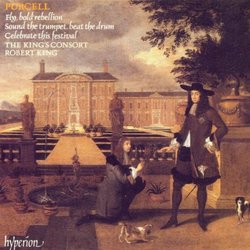| All Artists: Henry Purcell, James Bowman, Jonathan Peter Kenny, King's Consort, Gillian Fisher, Tessa Bonner, Rufus Muller Title: Purcell: Complete Odes and Welcome Songs Volume 3 - Fly, bold rebellion; Sound the trumpet, beat the drum; Celebrate this festival Members Wishing: 1 Total Copies: 0 Label: Hyperion UK Release Date: 11/17/1993 Album Type: Import Genre: Classical Styles: Opera & Classical Vocal, Historical Periods, Baroque (c.1600-1750) Number of Discs: 1 SwapaCD Credits: 1 UPC: 034571164120 |
Search - Henry Purcell, James Bowman, Jonathan Peter Kenny :: Purcell: Complete Odes and Welcome Songs Volume 3 - Fly, bold rebellion; Sound the trumpet, beat the drum; Celebrate this festival
CD Details |
CD ReviewsPurcell would have been pleased 01/12/2000 (5 out of 5 stars) "The first ode on this CD - Fly bold rebellion - is one of Purcell's earliest odes. But it already shows the characteristics of Purcell's brand of vocal chamber music: vocal movements over a walking ground bass, followed by intricate string ritornelli, and imitative choruses with creative use of counterpoint. The highlight of this ode is the alto solo Be welcome then, great Sir (Bowman). The next ode - Sound the trumpet, beat the drum - was written somewhere between 1685 and 1687. Don't expect to find the famous alto duet "Sound the trumpet" here. That duet comes from Come ye sons of art (King included it in vol. 8 of his series). This ode starts inventively with a duet in which the line "Sound the trumpet" belongs to an alto and the line "Beat the drum" to the bass. A small chaconne included in the middle of the ode is a special delight. In fact, it was so successful that Purcell later reused it in King Arthur. A major winner is the alto duet "Let Caesar and Urania live" sung by Bowman and Covey-Crump (Did you ever notice how similar Bowman and Covey-Crump sound, especially when Covey-Crump means to sing alto?). The last ode - Celebrate this festival, written in 1698, was one of the numerous works Purcell wrote for Queen Mary. It is unusually long and richly scored. Especially effective is the 8-part chorus near the end of the ode."
|


 Track Listings (29) - Disc #1
Track Listings (29) - Disc #1